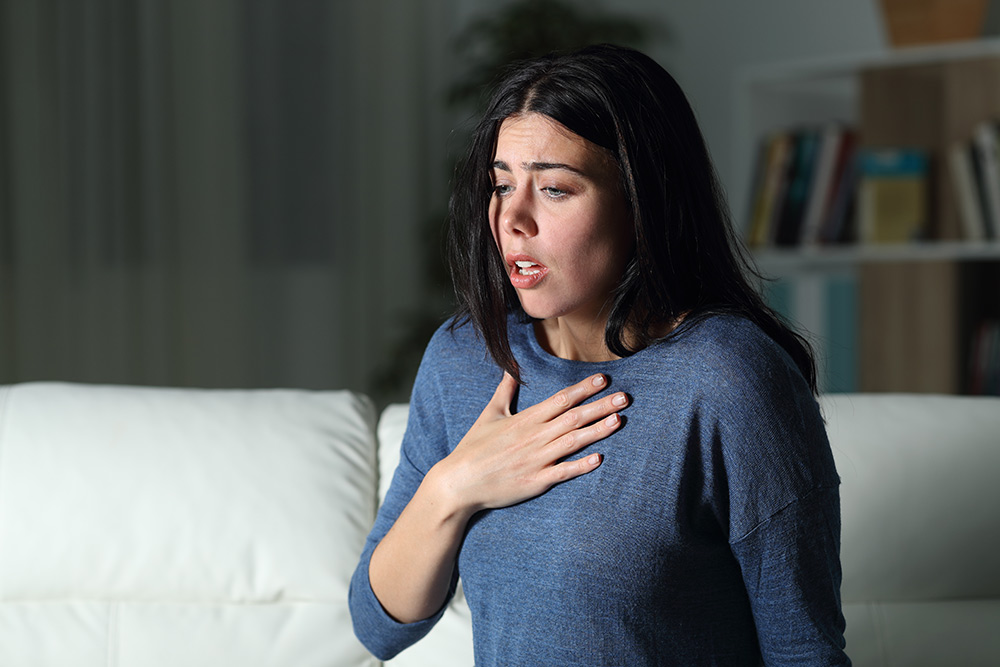Panic attacks are often caused by anxiety.
Anxiety is the body’s way of responding to stress. Anxiety triggers our body’s fight-or-flight response causing anxiety symptoms and panic attacks. In anxiety, symptoms provoke a response from the body to confront a certain situation as dangerous even though it might not be life-threatening or cause any harm. This is how anxiety can lead to panic attacks.
Many factors contribute to anxiety.
Nervous system overactivity, life experiences, genetics, and chemical imbalances in the brain are all factors. These factors make some people more susceptible to anxiety than others. Once anxiety sets in, it can trigger certain bodily responses that cause physical symptoms. These symptoms can lead to a panic attack if they are left untreated.
There are several reasons why someone may experience anxiety and develop panic attacks.
Anxiety can be triggered when there’s too much stress in your life or when you don’t get enough exercise or sleep regularly. Anxiety can also be caused by certain medications and medical conditions. Some anxiety disorders are triggered by specific fears, such as phobias or obsessive-compulsive disorder (OCD), or by past trauma as in posttraumatic stress disorder (PTSD).
What causes anxiety?
Anxiety disorders commonly occur in people who have a family history of anxiety, suggesting that anxiety is at least partly inherited. Anxiety disorders seem to run as deep as personality traits such as being cautious among those with panic disorder. While anyone can develop anxiety, it is more common among women than men. Some research indicates that females may be twice as likely as males to experience anxiety.
Panic attacks cause physical symptoms that mimic serious medical conditions like heart attacks or stroke, which makes them difficult to diagnose without testing. It’s important to get treatment for panic attacks so you can begin working on reducing anxiety and the frequency of attacks.
A panic attack can quickly escalate into a full-blown anxiety disorder if you don’t take steps to manage your anxiety.
Panic attacks cause both psychological and physical symptoms. During panic attacks, you may feel fear and anxiety that something bad is going to happen or is happening. Anxiety about having another panic attack can escalate to the point of becoming disabling. It’s important to know that while panic attacks are scary, they are not dangerous.
Panic symptoms can include trembling or shaking, sweating, shortness of breath, numbness or tingling sensations, rapid heartbeat, chest pain or discomfort, nausea or abdominal pain, feeling faint dizzy, or lightheaded, chills or hot flashes, fear of losing control or going “crazy,” and fear of dying.
Anxiety management is the most effective way to prevent panic attacks. Managing anxiety begins with identifying the anxiety-producing factors in your life. Then you can develop anxiety management strategies to help you deal with anxiety and panic attacks when they do occur.
Anxiety Management Strategies:
- Manage physical symptoms: If you’re experiencing a panic attack, try to relax and focus on calming yourself down until the anxiety passes. Try deep breathing exercises and progressive muscle relaxation.
- Identify your anxiety triggers: Learn to identify the physical sensations that trigger anxiety so you can start a stress management program or use relaxation techniques when anxiety begins to take hold. Some anxiety triggers can lead to anxiety and panic attacks.
- Exercise regularly: Research has shown that exercising regularly is an important part of anxiety management. Exercise plays a role in anxiety management by reducing stress hormones and increasing pleasant feelings associated with mood elevation.
- Relaxation techniques: These can help you manage anxiety by reducing anxiety symptoms through relaxation. Try breathing exercises, meditation, yoga, or muscle relaxation techniques.
- Get enough sleep: Getting enough sleep can help reduce anxiety. Try to create a relaxing nighttime environment for yourself by eliminating sources of noise and light. Set consistent sleep and wake times (at least 7 hours of sleep) and avoid screens before bedtime.
- Identify anxiety-producing patterns: Once anxiety triggers are identified, develop anxiety management plans that identify the anxiety-producing factors you would like to change. For example, self-medicating with alcohol or constantly worrying about the future are patterns that exacerbate anxiety.
- Cognitive behavioral therapy (CBT): This form of psychotherapy is effective for anxiety management. This therapy focuses on changing anxiety-producing thought patterns and behaviors.
Things to limit or avoid:
- Alcohol: Excessive drinking can exacerbate anxiety symptoms.
- Caffeine: Limit caffeine intake as caffeine increases anxiety by stimulating the central nervous system.
- Tobacco: Using tobacco may heighten anxiety.
- Sugar and high-fat foods: These can cause your blood sugar levels to spike and may lead to anxiety.




